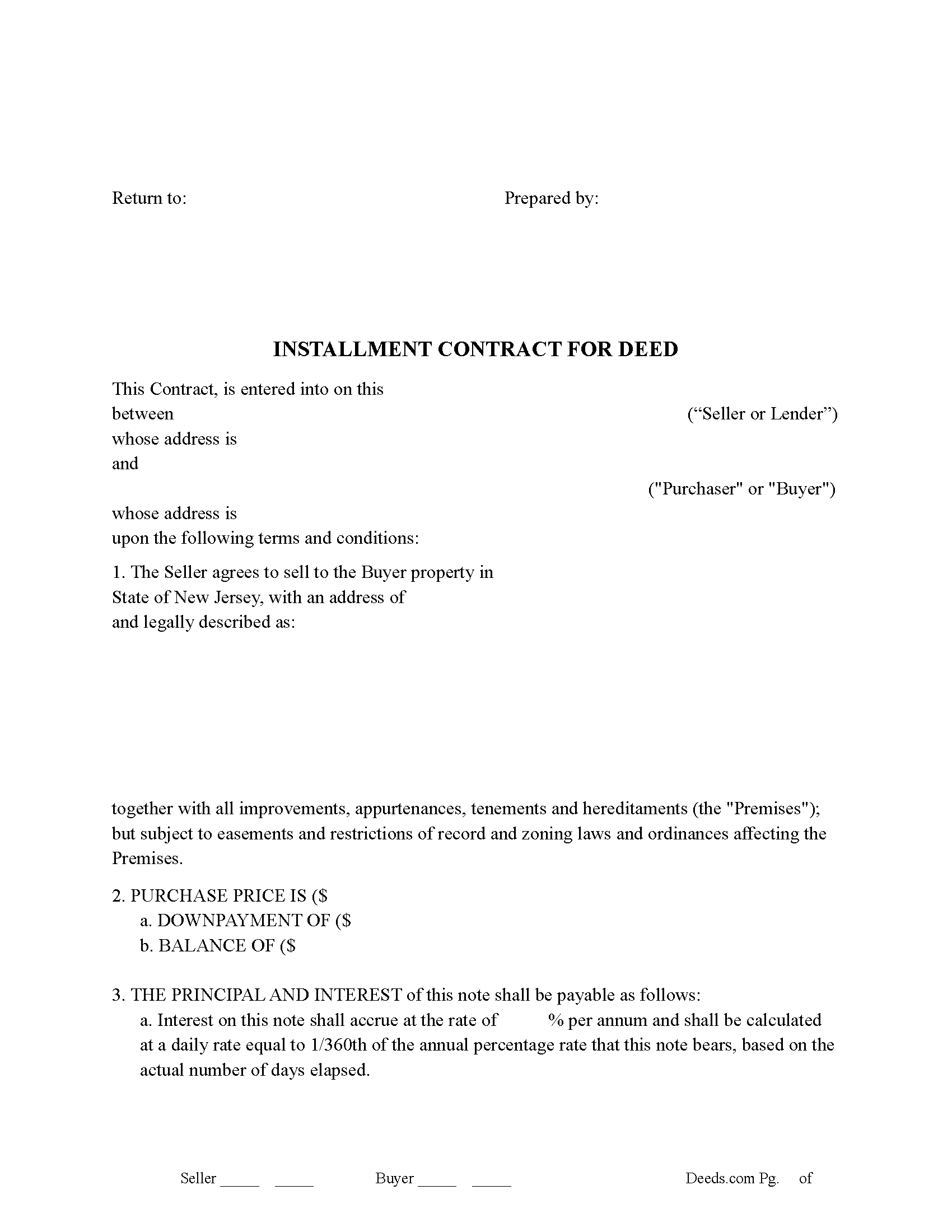Download New Jersey Installment Contract for Deed Legal Forms

New Jersey Installment Contract for Deed Overview

A "Contract for Deed" (also known as an installment land contract, land contract, or contract for sale) is a legal agreement where the buyer makes payments directly to the seller in exchange for the right to use the property. The buyer receives the deed and full ownership of the property only after all payments have been made.
Statutes and Legal Framework:
1. While New Jersey does not have specific statutes solely governing Contracts for Deed, they are generally governed by principles of contract law, real estate law, and consumer protection laws.
Key statutes include the New Jersey Consumer Fraud Act (N.J.S.A. 56:8-1 et seq.), which could apply to the contract if there is any fraud or deception involved.
2. Disclosure Requirements:
Sellers must provide accurate and complete disclosures regarding the property's condition, any liens, and any other material facts. Failing to do so may result in a violation of the Consumer Fraud Act.
If the contract is entered into without full disclosure or under deceptive terms, it may be considered voidable.
3. Recording the Contract:
While it is not always required to record a Contract for Deed, it is strongly advised. Recording the contract protects the buyer's interest in the property against future claims or liens against the seller.
4. Default and Foreclosure:
If the buyer defaults on the contract, the seller may initiate a foreclosure-like process. However, because this is a non-mortgage transaction, the process can vary, and the seller might be able to evict the buyer through summary eviction proceedings rather than formal foreclosure.
In some cases, New Jersey courts have treated Contract for Deed arrangements similarly to mortgages, requiring sellers to undergo judicial foreclosure to reclaim the property.
5. Right to Cure Default:
The contract should clearly state the buyer's rights if they default, including any grace period to cure the default before the seller can take action.
6. Interest Rates and Financing Terms:
The interest rate and financing terms must comply with New Jersey’s usury laws. If the interest rate exceeds the legal limit, the contract could be voided or reformed by a court.
Procedures for Using a Contract for Deed
1. Drafting the Contract:
The contract must include all essential terms: purchase price, payment schedule, interest rate, penalties for default, responsibilities for taxes and insurance, and the date when the deed will be transferred.
Legal counsel is often necessary to ensure that the contract complies with New Jersey law.
2. Execution and Recording:
Both parties must sign the contract, and it should be notarized. Recording the contract with the county clerk where the property is located is advisable.
3. Payment and Maintenance:
The buyer makes monthly installment payments to the seller, who retains legal title until the contract is fully paid.
The buyer takes on responsibilities such as property taxes, insurance, and maintenance.
Terms and uses
1. TITLE AND TITLE INSURANCE. Seller shall provide Buyer with a standard form owner’s policy of title insurance in the amount of the purchase price. The title policy to be issued shall contain no exceptions other than those provided in said standard form plus encumbrances or defects approved by Buyer as provided below.
2. DEED Of CONVEYANCE. Upon receipt of Buyer's payment in full of the balance of the purchase price, Seller shall furnish a General Warranty Deed, conveying to Buyer title to the property.
3. LATE CHARGE: Any above noted payment which is at least days past due, shall be subject to a late charge of $ And an additional $ per day until the payment is received. If any balloon payment is late, it shall be subject to a late fee of $ per day.
4. Uses include residential property, rental property up to 4 units, condominiums, and planned unit developments. Traditional installment payment with or without a balloon payment.
For use in New Jersey only.